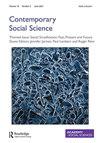Higher education and research: multiple negative effects and no new opportunities after Brexit
IF 3.9
Q1 SOCIAL SCIENCES, INTERDISCIPLINARY
引用次数: 3
Abstract
ABSTRACT Brexit has weakened collaboration between UK higher education institutions and their EU counterparts, with negative implications for UK resources and capacity, without leading to new global strategies and opportunities. In 2020 the UK government withdrew from the Erasmus student mobility scheme and introduced the Turing scheme. While Erasmus had supported both outward UK student mobility and inward movement from Europe, Turing supports only outward mobility. In 2021–2022 the cessation of UK tuition fee arrangements for EU citizens entering UK degrees led to a sharp drop in numbers. Collaborative European research programmes have been crucial in building the infrastructure and network centrality of UK science and in attracting EU citizen researchers, but at the time of writing future UK participation as a non-member country was unresolved. The long uncertainty about this, coupled with the cessation of free people movement, have triggered the exit of some UK-based researchers and declines in UK researchers' competitiveness in European grants, EU doctoral students and established researchers entering UK, and EU country citizens as a proportion of UK academic staff. In addition, the loss of access to European structural funds has slowed the modernisation of UK higher education institutions and reduced their social contributions.高等教育和研究:英国脱欧后的多重负面影响和新机遇
英国脱欧削弱了英国高等教育机构与欧盟同行之间的合作,对英国的资源和能力产生了负面影响,而没有带来新的全球战略和机遇。2020年,英国政府退出了伊拉斯谟学生流动计划,引入了图灵计划。伊拉斯谟支持英国学生向外流动和从欧洲向内流动,而图灵只支持向外流动。2021-2022年,英国停止了对欧盟公民攻读英国学位的学费安排,导致人数急剧下降。欧洲合作研究项目在建立英国科学的基础设施和网络中心以及吸引欧盟公民研究人员方面至关重要,但是在撰写本文时,英国作为非成员国的未来参与尚未解决。长期以来的不确定性,再加上自由人员流动的停止,已经引发了一些英国研究人员的退出,以及英国研究人员在欧洲资助、欧盟博士生和进入英国的知名研究人员以及欧盟国家公民占英国学术人员比例方面的竞争力下降。此外,无法获得欧洲结构性基金,也减缓了英国高等教育机构的现代化进程,减少了它们的社会贡献。
本文章由计算机程序翻译,如有差异,请以英文原文为准。
求助全文
约1分钟内获得全文
求助全文
来源期刊

Contemporary Social Science
SOCIAL SCIENCES, INTERDISCIPLINARY-
CiteScore
6.40
自引率
8.30%
发文量
15
 求助内容:
求助内容: 应助结果提醒方式:
应助结果提醒方式:


